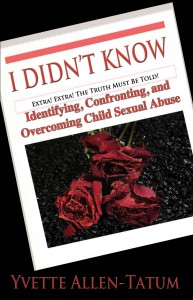I Didn’t Know: A Conversation with Yvette Allen-Tatum
October 22, 2013
[jwplayer mediaid=”2099″]
[1]Children are suffering from a hidden epidemic of child abuse and neglect. Every year more than 3 million reports of child abuse are made in the United States involving more than 6 million children (a report can include multiple children). The United States has the worst record in the industrialized nation – losing five children every day due to abuse-related deaths. Factor in Child Sexual Abuse (CSA), 9.3% of all child abuse reports are for children who have been sexually abused.
[2]Here are some quick facts: (studies by David Finkelhor, Director of Crimes Against Children Research Center)
- 90% of sexually abused victims know their offenders;
- 1 in 5 girls and 1 in 20 boys fall victim to child sexual abuse;
- Self-reported studies show that 20% of adults females and 5-10% of adult males recall a childhood sexual assault or sexual abuse incident;
- During a one-year period in the United States, 16% of youth ages 14 to 17 had been sexually victimized; and
- Children are most vulnerable to child sexual abuse between the ages of 7 and 13.
In my new book, I Didn’t Know: Identifying, Confronting, and Overcoming Child Sexual Abuse I reference 8 myths about child abuse:
Myth # 1
Normal-appearing, well educated, middle-class people don’t molest children.
One of the public’s most dangerous assumptions is the belief that a person who both appears and acts normal could not be a child molester. Sex offenders are well aware of our propensity for making assumptions about private behavior from one’s public presentation. In fact, as recent reports of abuse by priests have shown, child molesters rely on our misassumptions to deliberately and carefully set and gain access to child victims.
Myth #2
People are too quick to believe an abuser is guilty, even if there is no supporting evidence.
In truth, people are too quick to believe that the accused is innocent, even if there is plenty of supporting evidence.
Myth #3
Child molesters molest indiscriminately.
Not everyone who comes in contact with a child molester will be abused. Although this finding may seem obvious, some interpret the fact that an abuser didn’t molest a particular child in their care to mean that those children who do allege abuse must be lying. In truth, sex offenders tend to carefully pick and set up their victims Thus while sex offenders may feel driven to molest children, they rarely do so indiscriminately or without a plan.
Myth #4
Children who are being abused would immediately tell their parents.
The fact victims often fail to disclose their abuse in a timely fashion is frequently used as evidence that an alleged victim’s story should be doubted. Research, however, shows that children who have been sexually assaulted often have considerable difficulty in revealing or discussing their abuse.
Myth #5
Children who are being abused will show physical evidence of abuse.
A lack of physical evidence of sexual assault is often cited as support that an alleged perpetrator must be innocent. However, research shows that abnormal genital findings are rare even in cases where the abuse has been proven. Some acts, like fondling and oral sex, leave no physical traces. Even injuries from penetration heal very quickly in young children and thus abnormal genital findings are not common, especially if the child is examined more than 48 hours after the abuse. In fact, even with proven penetration in up to 95% of cases, genital examinations will be essentially normal.
Myth #6
Hundreds of innocent men and women have been falsely accused and sent to prison for molesting children.
Over and over again, the media has raised the question whether America is in the midst of a hysterical overreaction to the perceived threat from pedophiles. Actual research, however, shows that, as a whole, our society continues to under-react and under-estimate the scope of the problem.
Myth #7
If asked about abuse, children tend to exaggerate and are prone to making false accusations.
Contrary to the popular misconception that children are prone to exaggerate sexual abuse, research shows that children often minimize and deny, rather than embellish what has happened to them.
Myth #8
By using repeated interviews, therapists or police can easily implant false memories and cause false accusations among children of any age.
Although research has consistently shown that children rarely confabulate about having been abused and false allegations have been found to be rare, the potential for false allegations continues to be an area of great concern in sex abuse cases.
I no longer refer to myself as a child abuse victim or a child abuse survivor. I am a child abuse thriver (term not in dictionary). In Hosea 4:6, it states (paraphrasing), “My people suffer for lack of knowledge.” As it relates to the subject of Child Sexual Abuse, the United States does not have a clear and accurate understanding of CSA. Why?
• Many do not know what Child Sexual Abuse is;
• Some think CSA is limited to penetration;
• People are uncomfortable talking about CSA; and
• Many reject the facts and choose to believe the myths.
In short, you cannot conquer what your will not confront. Therefore, it is imperative that we are able to Identify Child Sexual Abuse in order to Confront Child Sexual Abuse and thus, Overcome Child Sexual Abuse.
[1] U.S. Department of Health and Human Services, Administration for Children and Families, Administration on Children, Youth and Families, Children’s Bureau. (2012). Child Maltreatment 2011. Available from http://www.acf.hhs.gov/programs/cb/research-data-technology/statistics-research/child-maltreatment
[2]The National Center For Victims of Crime. (2012). Child Sexual Abuse Statistics. Available from http://www.victimsofcrime.org/media/reporting-on-child-sexual-abuse/child-sexual-abuse-statistics.







